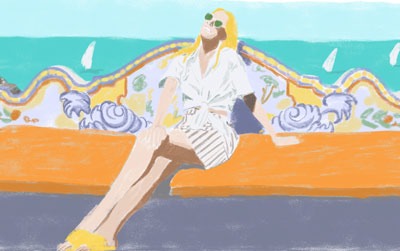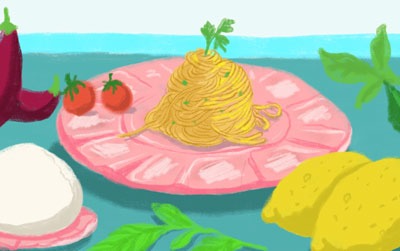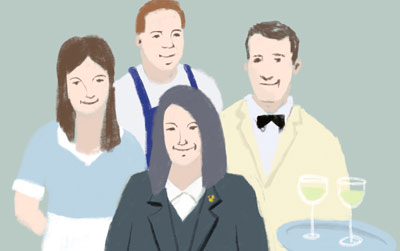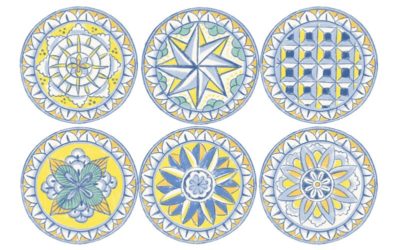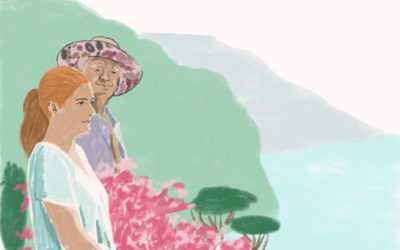4 January, 2021
The Life and Times of Giorgio Maccioni
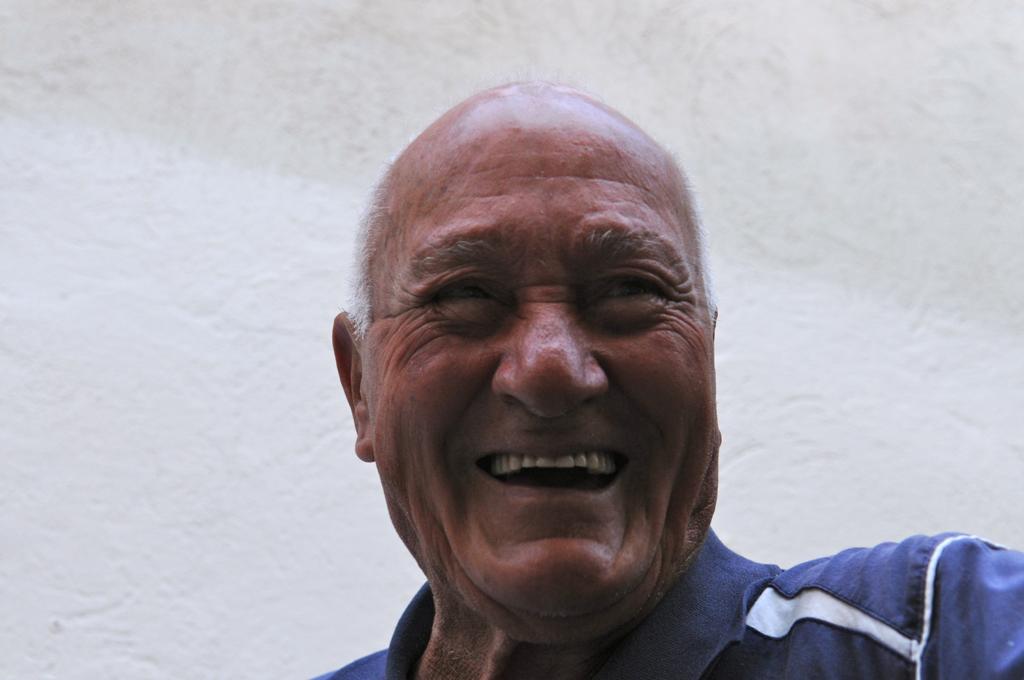 Giorgio Maccioni, from Monsummano Terme arrived in Positano, shortly after the Second World War. His aunt, a spinster, had brought him along when she moved to Positano to help her sister with her four children. On arrival, his aunt was appointed director of the Positano post office and Giorgio made himself useful by helping her deliver the mail, becoming a well-known face and making friends around the village. Giorgio was a good-looking guy, resembling Alberto Sordi, though I would venture to say he was more handsome than the famous actor and I don’t say this out of affection but as fact.
Giorgio Maccioni, from Monsummano Terme arrived in Positano, shortly after the Second World War. His aunt, a spinster, had brought him along when she moved to Positano to help her sister with her four children. On arrival, his aunt was appointed director of the Positano post office and Giorgio made himself useful by helping her deliver the mail, becoming a well-known face and making friends around the village. Giorgio was a good-looking guy, resembling Alberto Sordi, though I would venture to say he was more handsome than the famous actor and I don’t say this out of affection but as fact.
Following this brief parenthesis at the post office, he became Raimondo Orselli’s butler. A man of great charm, Orselli was a Florentine antiquarian who owned a beautiful villa, now the Palazzo San Giacomo. He had likely noticed the smart yet kind lad, sure-footed and quick as he delivered the mail around town, singing the songs of his beloved Claudio Villa or Domenico Modugno, for Giorgio loved to sing. Orselli immediately summoned Giorgio to come to work for him instead.
As birds of a feather, the flamboyant Florentine became a great friend of my Uncle Carlino and at the San Pietro’s inauguration, gifted him the beautiful Sicilian trumò that, today and forever will remain in the hotel lobby. An extremely elegant and charming person, Orselli enjoyed the fame of being the “tombeur de femmes”, another reason he and Carlino became fast friends. By virtue of this commonality of interests, my uncle regularly frequented the Orselli house where the most beautiful and elegant parties of the time were celebrated. In winter, Orselli would leave his Positano residence for lengthy periods of time to return to Florence.
Giorgio, being an acutely intelligent person, had long sensed Positano’s great tourist potential. His working and human experience with Orselli had enriched his wealth of knowledge, as he waited on the international and colorful world of aristocrats, artists, adventurers and entertainers who were starting to holiday in the small coastal town. Giorgio had grown used to Positano’s mild climate, the sea, the people, the food and he never wanted to return to Florence. And so he eagerly accepted Carlino’s offer to work full-time at the Miramare, the San Pietro’s illustrious predecessor. In the summer, Giorgio worked at the hotel with Uncle Carlino and quickly became an integral part of both the extended family and the intimate family. Extended family, as, almost immediately, Giorgio became the glue binding the entire Miramare work group together and intimate family, because he was much loved by all members of the large Attanasio / Cinque family.
Giorgio lived opposite the Hotel Poseidon in a two-room apartment; all that remained of Uncle Carlino’s house, which Carlino had partially demolished to give the Hotel Poseidon a better view. At the Miramare, Giorgio worked with Carlino’s sister, my grandmother, Carmela Cinque and her husband Vito Attanasio, parents to my mother Virginia and uncle Salvatore. Many recall how Giorgio would start his morning shifts at the Miramare singing. Singing had always been Giorgio’s companion in life. He sang when he was happy, when he was sad, when he had to get up and when he was alone, not to feel too alone. Others recalled how he would get up at five in the morning of his own initiative, to whitewash the hotel stairs with his colleague Aniello, before serving breakfast to customers with that magnetic smile of his.
With the morning work over, he would run down to the beach in Fornillo or the Marina Grande to bathe in the sea and lie in the sun like a lizard, recharging before his evening shift. The sun, singing and good wine were always a favorite pastime for the Tuscan who spoke Neapolitan with a Florentine accent. Come evening, he was again ready to delight clients with his presence and thoughtful service, a role which he stepped into like an actor taking the stage.
 He often quadrupled his salary thanks to the lavish tips he received from guests and for which he was very envied by his colleagues. When he happened to overhear or came to know of jealous comments made by his colleagues he would reply, ‘Sing, sing till it passes, it happened to me and it will happen to you too, oh colleague.’
He often quadrupled his salary thanks to the lavish tips he received from guests and for which he was very envied by his colleagues. When he happened to overhear or came to know of jealous comments made by his colleagues he would reply, ‘Sing, sing till it passes, it happened to me and it will happen to you too, oh colleague.’
In all his years of collaborating with our family, we heard nothing but compliments from guests about Giorgio’s work and many of those clients were well-traveled personalities of the caliber of Laurence Olivier, President Ford, the Rockefeller family, Maestro Armando Trovajoli, Robert De Niro, Barbara Straisand. Through them, Giorgio came to learn about the world and to become part of it.
In the morning, he would enter the rooms with a breakfast tray, singing and wishing guests a good day come sun, rain or hail. He was the most requested of all the waiters and many clients were willing to wait patiently until he was free to serve them breakfast in their room. Often this meant waiting quite awhile, as he would be held up much longer than necessary by guests who loved chatting with him.
On the occasion of his return to Monsummano, which he visited every year to spend time with his sister, Giorgio fell in love. He decided to stay in Florence, married and had a son, Massimo. Four years later he would become one of the first in Italy to file for divorce, a record he was quite proud of. After divorcing, he returned to his beloved Positano and resumed the life he had left. Carlino, in the meantime, had begun building his vision, and as the San Pietro took shape, Giorgio was always by my uncle’s side.
He was there when the San Pietro opened in 1970. All the guests attending that mythical evening of June 29th knew Giorgio and many congratulated him too. In 1976, my mother, Virginia, who had taken time away from the family’s Miramare hotel to care for her two young sons, my brother Carlo and I, resumed working with Uncle Carlino at the San Pietro. It was from this point, that the relationship Carlo and I had with Giorgio deepened, for it was he who met us at the end of every school day and fed us lunch. In the winter, he cooked for Uncle Carlino and his countless house guests, as well as Uncle Salvatore and our mother. I will always remember the taste of his fresh cherry tomato sauce, his penne pasta all’arrabbiata (we ate chilli pepper from an early age), his spaghetti with broccoli and cherry tomatoes, the capellini sciuè sciuè. He would say, ‘How about I make some capellini?’ And my brother Carlo would say, ‘Cook a double portion and I’ll eat it too.’ His artichoke and potato dish, his fried artichokes and his stock fish and potatoes are still fondly remembered by many in Positano. His secret ingredient in the kitchen was love.
After the grand opening, Uncle Carlino moved from Positano to live at the San Pietro. Sometimes in winter, Carlino would invite us for dinner, and since the kitchen was far from his apartment, Carlo and I would help Giorgio carry the food over. We carried pans of stock fish and potatoes, salads, sautéed and fried artichokes, salted codfish and bottles of Gragnano wine under our armpits, crossing the wide, empty corridors of the closed hotel. Giorgio was always worried that we would fall and hurt ourselves and he would affectionately shout warnings like, ‘Oi rascal, don’t get hurt… ..you understand? If you fall, everything will drop on the pavement and who cares, just please, don’t make me go crazy!’
Gradually, as I grew older, my relationship with Giorgio grew deeper still. Sometimes he talked to himself, asking himself questions which he also answered and whenever he saw me, we would converse on the most diverse topics. An intelligent person, he pondered over the future and was always moved by a great curiosity. He said, ‘I am ignorant because I have not studied, but I am not stupid and this is a very fine brain.’
In fact, his lifetime of great sacrifices had translated into an astronomical sum of money for the time and three apartments in Florence, all of which he gave to his only son on the day of his marriage. Giorgio was happy that his son, Massimo, had married, given him two grandchildren and opened a wholesale clothing store in Florence. Giorgio sometimes felt a little guilty about his divorce, but there was not a day in his life when his son was not at the center of his thoughts.
He contributed in a fundamental way to the constitution of the new San Pietro family, of which he was an indispensable part. In May of 1984, Carlino left us, called by Saint Peter to help embellish Paradise. Giorgio told me how, just a week earlier, my uncle had experienced a beautiful time of happiness when a dear friend of his visited; a woman I’d met, whose friendliness and beauty I remembered. She had come to Positano to spend a few days with Carlino and they often dined together on the terrace overlooking the sea and Positano. Giorgio prepared and served their meals and was part of his boss’ joy, as a great chunk of his life was spent looking through the lenses of Carlino’s eyes.
One evening, they went to dinner with Livia and Alfonso Iccarino at the Don Alfonso restaurant where they dined by the fireplace, enjoying a great sea bass and escarole salad. After dinner, Zio Carlino told Giorgio, the designated driver, ‘Giorgio, this evening is too good to end so soon. Let’s take a long ride around the Nastro d’Oro that passes through Massa Lubrense.’
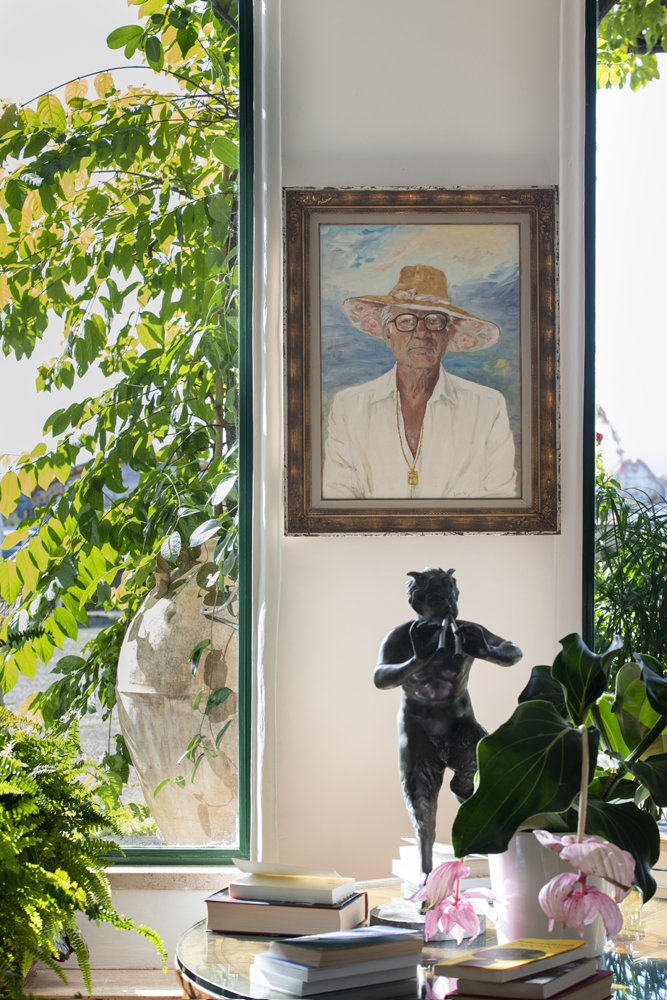
A few days after so much happiness, uncle Carlino fell asleep forever in the most beautiful of his beloved gardens. Giorgio suffered the loss of this man who had changed his life in sorrowful and painful silence. He worried over the fate of their much loved San Pietro hotel and rallied, like many but not all, to the side of Uncle Salvatore and mamma Virginia, with the same affection, esteem and dedication he had always shown. He was everywhere, accompanying my mother who never drove, taking us to school when the buses went on strike, cooking for us in the winter and caring for the flowers in the gardens that he loved. Those were difficult years for everyone, but Giorgio was happy. Happy to know that the San Pietro had been saved and was secure, in solid hands. Happy to see us grow and above all to feel an integral part of our family. Every winter he would visit his sister, his son and grandchildren and then return to us.
When Carlo and I start working with Uncle Salvatore and our mother, we saw Giorgio daily. In the winter, when the workers, maintenance staff and gardeners finished their day at the hotel, I would pass by the cafeteria where I was sure to find Giorgio and he would say, ‘let’s make some capellini sciuè sciuè!‘ I could never say no to him because his capellini were too good to refuse, but also because I liked having a chat with him. He knew about my girlfriends, about my studies, he knew everything.
The years passed and sadly, my uncle Salvatore also passed in 1996. It was another hard blow for Giorgio who had seen one more member of his extended family die. Again he worried about the generational change that was about to take place and tried to protect me and Carlo whenever he could. And again, after much time and effort, the San Pietro was saved, secure for another generation. One day he asked to speak to Carlo and I in private.
‘Guys, I’ve grown too old, it’s not good for you to see an old man like me walking around the hotel. Every shoe becomes a boot and I don’t want to make you look bad. ‘
The truth was that he now felt out of place and was sorry to occupy a position that could be useful to someone younger who needed it more than him. He had worked five years over the pension limit, paying more taxes than he’d bargained for. At that moment we asked ourselves, ‘Whatever will we do now?’ You never think that someone in your family will retire from the family.
To our deep regret, we had to acknowledge that almost 65 years had passed since the beginning of this wonderful 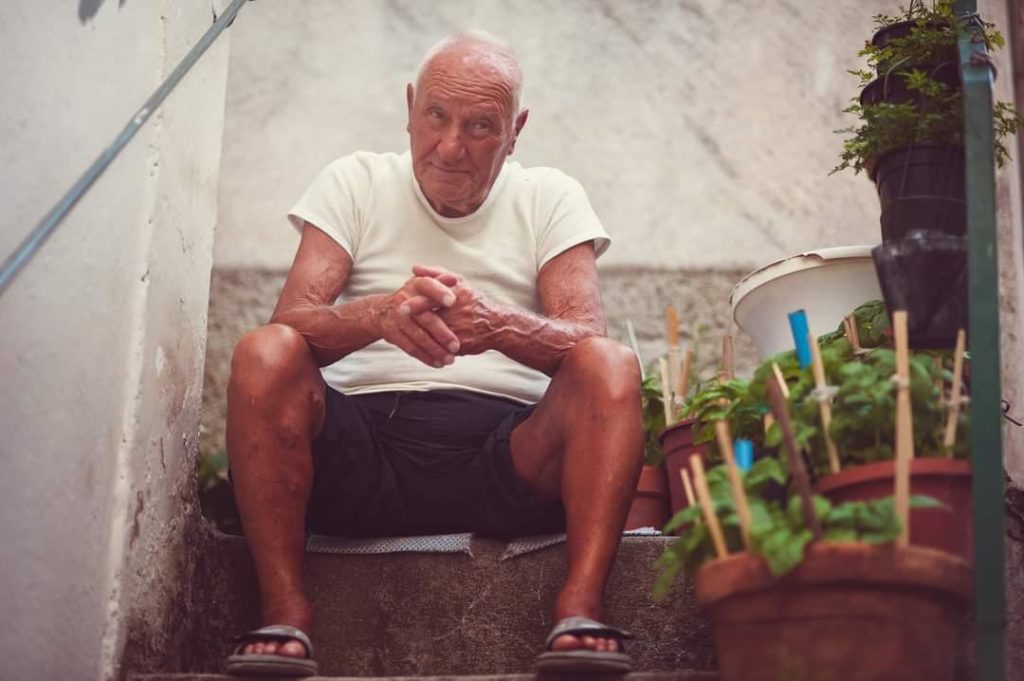 relationship with Giorgio. He continued living in Positano, in that tiny apartment Uncle Carlino had given to him years ago. I often met him on the street, where he liked spending his time talking to old friends in the neighbourhood.
relationship with Giorgio. He continued living in Positano, in that tiny apartment Uncle Carlino had given to him years ago. I often met him on the street, where he liked spending his time talking to old friends in the neighbourhood.
Several years passed in which he often came to visit us and the nostalgia grew too great for us all, so we decided by mutual agreement, that we would be very happy, if he wished, to spend half of his life in his San Pietro and the other half in Positano. This was how Giorgio found himself with two residences; one in the San Pietro and the other in his small apartment in Punta Regina. More years passed and Giorgio again wished to speak with us.
‘Guys, I’m too old and I don’t want you to feel worried about me staying in this big hotel at night.’
So he returned to live in his Positano apartment permanently. In the afternoons, as per his usual habit, he would lie in the sun to recharge his batteries. One such afternoon, descending from the upper floor of his little house, Giorgio fell and broke his leg. The neighbors immediately called the ambulance to take him to the Cava dei Tirreni hospital. He did not know that I had also been alerted and was following behind the ambulance in my car. When the doctors led me into his room, I found the nurse at his bedside asking if he had any family. Seeing me come in, he answered, ‘Here he is, my son!’ and he began to cry.
Giorgio thought that the fall had caused his leg to break, but the truth was that his thigh bone had become too weak to support his weight. After a few days, his son, Massimo, who I kept in constant contact with, came down to Cava dei Tirreni with an ambulance and took Giorgio back to Florence to operate. Following the successful operation, he stayed in Florence with Massimo and his wife, where he was pampered and cared for.
We all missed him very much, especially our mother, Virginia. I think Giorgio was the man my mother spent the most time with throughout her life. We often called him, and he let us know that he was in good health, that he took great pleasure in visiting a nice retirement home in the countryside where he had made many friends (we were not at all surprised) and where, despite his thigh bone, he would run to the aid of his companions who were less agile than he.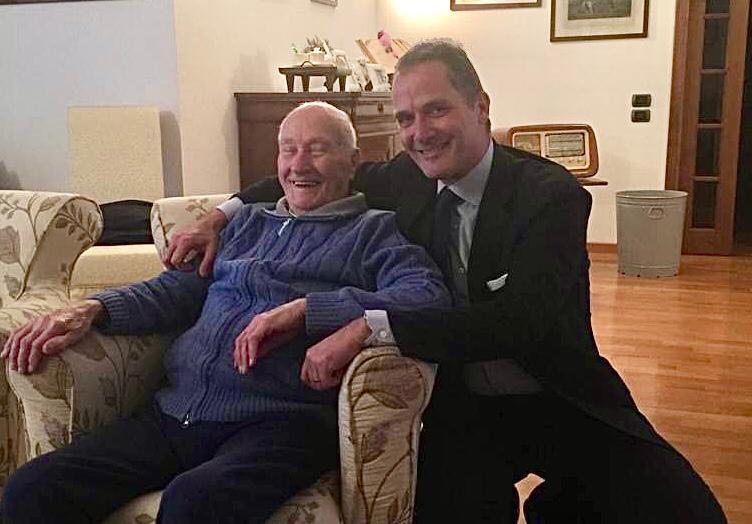
In March, 2018, I had to be in Florence for the first edition of Duco Italia, so I called Massimo to say that I would be very pleased to see Giorgio. I arrived at a beautiful building and found him waiting, smiling as always, handsome and elegant as he had always been to my eyes all these years. We looked at each other like two lovers and then he yelled, ‘Oh rascal, come and sit next to me!’
Giorgio was serene, after having worked so hard and living so far from his son, he was happy to be at home with him in the end. Massimo’s wife would cook his favorite dishes, preparing salted codfish for him once a week. Giorgio was a man who was satisfied with little and knew how to express it to you with a kind gesture and an incomparable smile. I saw that he was content.
Then the difficult day came when Massimo called to tell me, ‘Vito, my father is no longer with us. I had to tell you a week later, because he did not want me to bother you.’
I miss him a lot, I miss him often and I think about how lucky we were to have him with us, in our family, for so many years. We all loved each other very much and that is most important thing in life. Thank you, dear Giorgio. Thank you for everything you represented, everything you did for us. Thank you always and forever.
